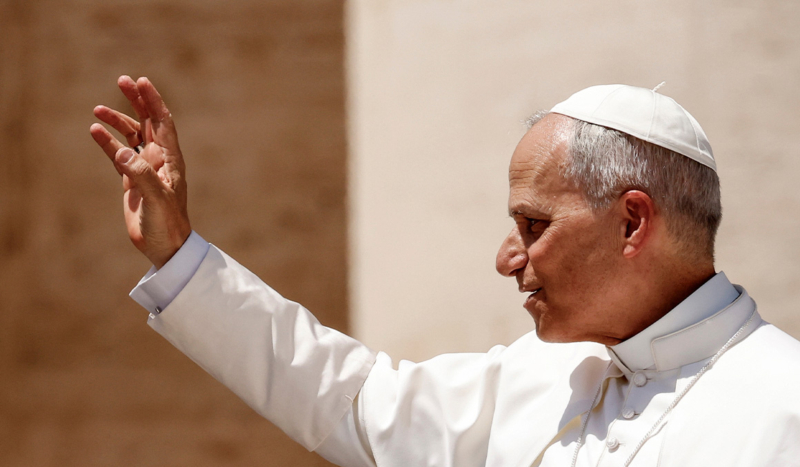
Riccardo De Luca - Update / Shutterstock.com
In a July 13 homily about the Sunday gospel’s Good Samaritan parable, Pope Leo XIV emphasized that Jesus asks Christians not to pass by people who are suffering, but to stop and help them with an open, compassionate heart.
This parable “troubles our dormant or distracted consciences, and warns us about the risk of a complacent faith that is satisfied with the outward observance of the law but incapable of feeling and acting with the same merciful compassion as God,” Pope Leo said in the homily for the Mass celebrated at the Pontifical Parish of Saint Thomas of Villanova at the Castel Gandolfo.
Each person who interacts — or refuses to interact — with the wounded man lying on the roadside in the parable gives an example of what compassion is, or is not, according to the Pope.
Only the Good Samaritan stops and actually helps him, while others merely look at him and keep walking.
“Dear brothers and sisters, how we look at others is what counts, because it shows what is in our hearts,” Pope Leo said. “We can look and walk by, or we can look and be moved with compassion. There is a kind of seeing that is superficial, distracted and hasty, a way of seeing while pretending not to see. We can see without being touched or challenged by the sight.”
“Then too, there is seeing with the eyes of the heart, looking more closely, empathizing with the other, sharing his or her experience, letting ourselves be touched and challenged,” he continued. “This way of seeing calls into question the way we live our life and the responsibility we feel towards others.”
Further, the parable shows how God sees human beings: with a gaze “so full of love and compassion,” the Pope said. After the sinful fall of Adam and Eve, God the Father did not “walk past” humanity, but instead sent His Son Jesus into the world to save it.
“Like the man in the Gospel who was going down from Jerusalem to Jericho, humanity was descending to the depths of death; in our own day too, we have to confront the darkness of evil, suffering, poverty and the riddle of death,” Pope Leo said. “Yet God has looked upon us with compassion; He wanted to walk our same path and come down among us. In Jesus, the Good Samaritan, He came to heal our wounds and to pour out upon us the balm of His love and mercy.”
A disciple of Jesus must then take on this compassion as well, and to feel what He feels, the Pope said: “It means learning to have a heart that is moved, eyes that see and do not look away, hands that help others and soothe their wounds, shoulders that bear the burden of those in need.”
The starting point for learning this compassion, he continued, is allowing oneself to be healed and loved by Jesus, so that one can then be a witness of His love to the world.
“Brothers and sisters, today we need this ‘revolution of love,’” Pope Leo said. “Today, the road that goes down from Jerusalem to Jericho is the road travelled by all those who descend into sin, suffering and poverty.”
This road is “travelled by all who fall down, lose their bearings and hit rock bottom,” he continued. “The road travelled by all those peoples that are stripped, robbed and pillaged, victims of tyrannical political systems, of an economy that forces them into poverty, and of wars that kill their dreams and their very lives.”
Pope Leo challenged the faithful to help those in these situations as the Good Samaritan would and asked all to reflect on how they currently respond.
“Do we look and walk by, or do we open our hearts to others, like the Samaritan?” he said. “Are we content at times merely to do our duty, or to regard as our neighbor only those who are part of our group, who think like us, who share our same nationality or religion? Jesus overturns this way of thinking by presenting us with a Samaritan, a foreigner or heretic, who acts as a neighbor to that wounded man. And He asks us to do the same.”
It is crucial, the Pope emphasized, to allow one’s heart to be moved by others in need — and to allow encounters with them to interrupt one’s own busy life.
“Looking without walking by, halting the frantic pace of our lives, allowing the lives of others, whoever they may be, with their needs and troubles, to touch our heart,” Pope Leo said. “That is what makes us neighbors to one another, what generates true fraternity and breaks down walls and barriers. In the end, love prevails, and proves more powerful than evil and death.
“Dear friends, let us look to Christ, the Good Samaritan. Let us listen again today to His voice. For He says to each of us, ‘Go and do likewise’.”
>> Pope Leo in Angelus address: Eternal life is not gained by cheating death <<

